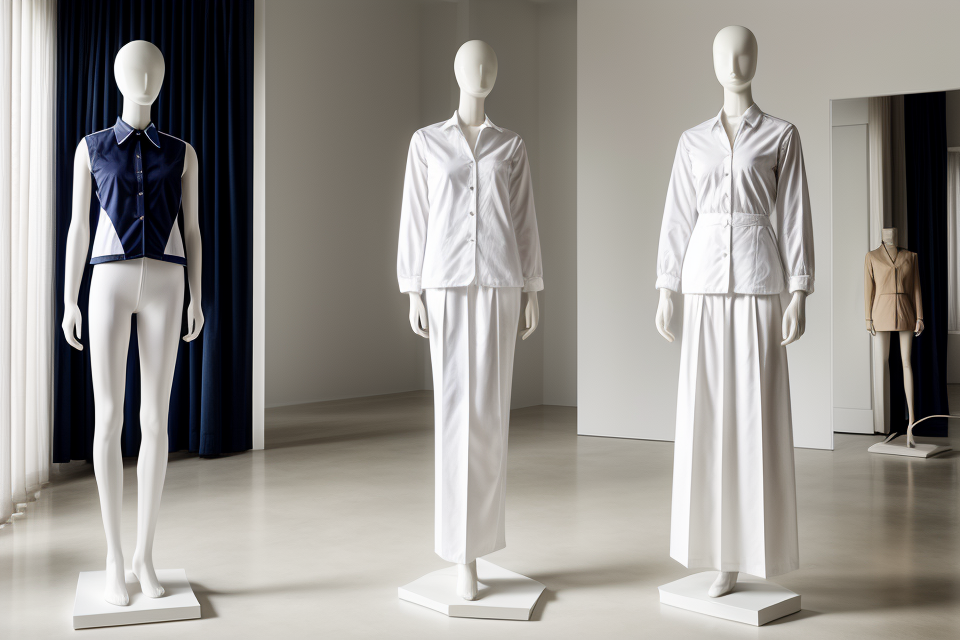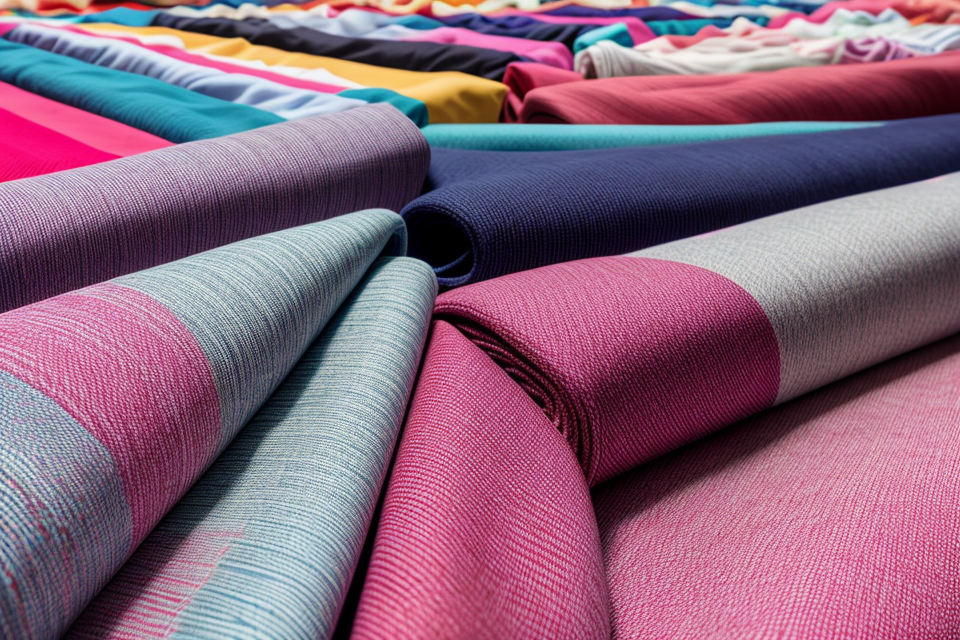
Uniforms are an essential part of our daily lives, especially for those who work in the corporate or hospitality industry. With so many options available, choosing the right fabric for your uniform can be a daunting task. Cotton and polyester are two of the most popular fabrics used in uniform making, each with its own set of pros and cons. In this article, we will explore the differences between cotton and polyester uniforms, and determine which material reigns supreme. From their durability and comfort to their environmental impact, we will cover it all. So, buckle up and get ready to discover which fabric is the perfect fit for your needs.
The Importance of Choosing the Right Uniform Material
Factors to Consider When Selecting Uniform Materials
When it comes to choosing the right material for a uniform, there are several factors to consider. Comfort, durability, breathability, water resistance, and cost are all important factors to keep in mind when selecting the right material for a uniform.
Comfort
Comfort is an essential factor to consider when selecting a uniform material. Uniforms that are made from materials that are uncomfortable or restrictive can cause discomfort and make it difficult for individuals to perform their job duties effectively. This can lead to decreased productivity and employee morale. In contrast, materials that are comfortable and flexible can increase employee comfort and job satisfaction.
Durability
Another important factor to consider when selecting a uniform material is durability. Uniforms that are made from materials that are prone to tearing or wearing down quickly can be costly to replace and can cause disruptions in operations. Materials that are more durable, such as polyester, can withstand more wear and tear and can last longer, reducing the need for frequent replacements.
Breathability
Breathability is also an important factor to consider when selecting a uniform material. Uniforms that are made from materials that do not breathe well can cause individuals to feel hot and uncomfortable, especially in warmer environments. Materials that are more breathable, such as cotton, can help to regulate body temperature and keep individuals cool and comfortable.
Water Resistance
Another important factor to consider when selecting a uniform material is water resistance. Uniforms that are made from materials that are not water-resistant can become soaked through and can cause discomfort and decreased productivity. Materials that are more water-resistant, such as polyester, can repel water and keep individuals dry and comfortable, even in wet environments.
Cost
Finally, cost is an important factor to consider when selecting a uniform material. Some materials, such as cotton, may be more affordable upfront, but may require more frequent replacements and may be more expensive in the long run. Other materials, such as polyester, may be more expensive upfront, but may be more durable and may require fewer replacements over time. It is important to consider both the upfront and long-term costs when selecting a uniform material.
Cotton Uniforms: A Classic Choice
Advantages of Cotton Uniforms
- Softness and comfort: Cotton is a soft and comfortable material that is known for its natural feel. This makes it a popular choice for uniforms, as it is gentle on the skin and provides a comfortable fit.
- Natural material: Cotton is a natural material that is biodegradable and renewable. This makes it an environmentally friendly choice for uniforms, as it is a sustainable option that can be produced without harming the environment.
- Good moisture-wicking properties: Cotton has good moisture-wicking properties, which means it can absorb and evaporate sweat quickly. This makes it an ideal choice for uniforms that are worn in hot and humid environments, as it can help keep the wearer cool and comfortable.
- Good for hot weather conditions: Cotton is a lightweight material that is breathable and cool to the touch. This makes it an excellent choice for uniforms that are worn in hot weather conditions, as it can help keep the wearer cool and comfortable.
Disadvantages of Cotton Uniforms
- Cotton uniforms are prone to shrinking and wrinkling, which can be a disadvantage for those who require a more durable and easy-to-maintain option.
- Cotton is a more expensive material compared to other fabrics, which may be a concern for organizations with a limited budget.
- Cotton uniforms may not be as water-resistant as other materials, which can be a drawback for those who work in environments where they may be exposed to moisture or water.
Polyester Uniforms: A Modern Alternative
Advantages of Polyester Uniforms
One of the main advantages of polyester uniforms is their high durability. Polyester is a synthetic fiber that is known for its strength and resilience, making it an ideal material for uniforms that need to withstand regular wear and tear. Additionally, polyester uniforms are generally more resistant to shrinking, fading, and wrinkling compared to cotton uniforms, which can save time and effort in terms of laundry and maintenance.
Another advantage of polyester uniforms is their low cost. Polyester is a cost-effective material that is easier and cheaper to produce than natural fibers like cotton. This means that polyester uniforms are often more affordable than cotton uniforms, making them a practical choice for schools, businesses, and organizations that need to purchase uniforms in bulk.
Polyester uniforms also have good moisture-wicking properties. This means that they can effectively draw sweat away from the body, keeping the wearer cool and comfortable during physical activity. This makes polyester uniforms a popular choice for sports teams and active individuals who need a uniform that can handle intense physical exertion.
Additionally, polyester uniforms are a good choice for cold or wet weather conditions. Polyester is an insulating material that can help keep the wearer warm in cold temperatures, while also repelling moisture. This makes polyester uniforms a practical choice for outdoor activities or environments where exposure to the elements is unavoidable.
Lastly, polyester uniforms are easy to care for. They can be machine washed and dried without shrinking or losing their shape, and they typically require less ironing than cotton uniforms. This means that polyester uniforms are a convenient and low-maintenance option for busy individuals or organizations that need to keep their uniforms looking clean and presentable.
Disadvantages of Polyester Uniforms
Polyester uniforms have become increasingly popular due to their durability and low maintenance requirements. However, there are several disadvantages associated with polyester uniforms that must be considered before making a decision.
Less comfortable than cotton
One of the main disadvantages of polyester uniforms is that they are less comfortable than cotton uniforms. Polyester is a synthetic material that can feel stiff and unyielding, which can make it uncomfortable to wear for extended periods. Cotton, on the other hand, is a natural material that is soft and breathable, which makes it more comfortable to wear.
Synthetic material
Another disadvantage of polyester uniforms is that they are a synthetic material. This means that they are not made from natural fibers and are therefore not as environmentally friendly as cotton uniforms. The production of polyester also requires more energy and chemicals than the production of cotton, which can have a negative impact on the environment.
Poor breathability
Polyester uniforms are also known for their poor breathability. This means that they can become hot and sweaty when worn in warm or humid conditions. Cotton, on the other hand, is a highly breathable material that can help to keep the wearer cool and comfortable.
Can cause allergic reactions in some individuals
Finally, polyester uniforms can cause allergic reactions in some individuals. This is because polyester is a synthetic material that can irritate the skin of some people. Cotton, on the other hand, is a natural material that is less likely to cause allergic reactions.
In conclusion, while polyester uniforms have several advantages, including their durability and low maintenance requirements, they also have several disadvantages that must be considered. These include their lack of comfort, being a synthetic material, poor breathability, and the potential to cause allergic reactions in some individuals.
Comparing Cotton and Polyester Uniforms: Pros and Cons
Comfort
When it comes to comfort, cotton and polyester uniforms offer different experiences. Cotton is often preferred for its softness and breathability, which can make it more comfortable to wear for extended periods. However, cotton is also prone to shrinking or wrinkling, which can affect its overall durability and make it less suitable for certain settings.
On the other hand, polyester is less comfortable than cotton due to its synthetic nature. However, polyester uniforms are generally more durable and easier to care for, as they can withstand frequent washing and drying without losing their shape or color. Additionally, polyester is less prone to wrinkling, which can make it a better choice for uniforms that require a professional appearance.
It’s important to note that individual preferences can play a significant role in determining which material is more comfortable. Some people may find cotton to be more comfortable, while others may prefer the durability and ease of care offered by polyester. Ultimately, the best material for a uniform will depend on the specific needs and preferences of the wearer and the setting in which the uniform will be used.
Durability
When it comes to durability, cotton and polyester uniforms have their own unique characteristics.
Cotton
Cotton is known for its softness and breathability, making it a popular choice for uniforms. However, it is also prone to wrinkling and can shrink when washed, which can affect its durability.
- Pros:
- Soft and comfortable to wear
- Breathable material
- Can be easily cared for
- Cons:
- Lower durability compared to polyester
- Prone to wrinkling
- Can shrink when washed
Polyester
Polyester, on the other hand, is a synthetic material that is known for its high durability and resistance to wrinkling. However, it can be less breathable than cotton and may not be as comfortable to wear.
+ High durability
+ Resistant to wrinkling
+ Easy to care for
+ Less breathable than cotton
+ May not be as comfortable to wear
Overall, when it comes to durability, both cotton and polyester uniforms have their own advantages and disadvantages. Cotton may be softer and more comfortable, but it is less durable and more prone to wrinkling. Polyester, on the other hand, is more durable and resistant to wrinkling, but it may not be as comfortable to wear.
Breathability
When it comes to breathability, cotton and polyester uniforms have different properties. Cotton is known for its good moisture-wicking properties, which means it can move sweat away from the body and keep the wearer dry. However, cotton is less breathable compared to polyester. On the other hand, polyester has poor breathability, meaning it doesn’t allow air to flow through the fabric easily. However, polyester has good moisture-wicking properties, which makes it an excellent choice for activities that involve a lot of sweating.
In conclusion, when it comes to breathability, it’s essential to consider the specific needs of the wearer. If breathability is a top priority, then polyester may be the better choice. However, if moisture-wicking properties are more important, then cotton may be the better option.
Water Resistance
When it comes to water resistance, cotton and polyester uniforms have their own unique advantages and disadvantages.
Cotton:
- Cotton is a natural fiber that is less water-resistant compared to polyester.
- However, cotton can be treated with water-repellent finishes to make it more resistant to water.
- This treatment helps to protect the fabric from moisture, making it suitable for uniforms that require protection from wet conditions.
- Cotton is also breathable, which means it allows air to circulate around the body, keeping the wearer cool and comfortable.
Polyester:
- Polyester is a synthetic fiber that is more water-resistant compared to cotton.
- This makes it an ideal choice for uniforms that require protection from water, such as those worn by sailors or workers in wet environments.
- However, polyester is less comfortable in wet conditions compared to cotton.
- This is because polyester does not allow air to circulate around the body, which can cause the wearer to feel hot and uncomfortable in wet conditions.
- Additionally, polyester is less breathable than cotton, which can make it more prone to overheating.
In conclusion, when it comes to water resistance, both cotton and polyester uniforms have their own unique advantages and disadvantages. Cotton is more breathable and comfortable in wet conditions, but requires treatment to make it water-resistant. Polyester, on the other hand, is more water-resistant but less comfortable in wet conditions. The choice between the two ultimately depends on the specific needs and requirements of the uniform.
Cost
When it comes to the cost of cotton and polyester uniforms, there are several factors to consider.
Cotton uniforms tend to be more expensive than polyester uniforms. However, this higher cost can be justified by the comfort and quality of cotton. Cotton is a natural fiber that is soft to the touch and breathable, making it a popular choice for uniforms that need to be worn for long periods of time. In addition, cotton is known for its durability, which means that it can withstand repeated washing and wear.
Polyester uniforms, on the other hand, are typically less expensive than cotton uniforms. However, this lower cost may come at a price. While polyester is a synthetic fiber that is known for its strength and resistance to wrinkles, it is not as soft or breathable as cotton. This can make it less comfortable to wear for extended periods of time. In addition, polyester is not as durable as cotton, which means that it may need to be replaced more frequently.
Overall, when it comes to the cost of cotton and polyester uniforms, it is important to consider the specific needs of your organization. If you prioritize comfort and durability, cotton may be the better choice. However, if cost is a top concern, polyester may be the more practical option.
Factors to Consider
When choosing between cotton and polyester uniforms, there are several factors to consider that can help guide your decision. Here are some of the most important factors to keep in mind:
Your specific work environment
The type of work environment you are in can have a significant impact on the type of uniform you should choose. For example, if you work in a hot and humid environment, cotton uniforms may be more comfortable and breathable, while polyester uniforms may be more appropriate for cooler climates. Similarly, if you work in an environment where you are exposed to chemicals or other hazardous materials, you may want to choose a uniform made from a material that is resistant to these substances.
Your budget
Finally, your budget can also be a factor to consider when choosing between cotton and polyester uniforms. In general, cotton uniforms tend to be less expensive than polyester uniforms, but they may require more frequent washing and maintenance. Polyester uniforms, on the other hand, tend to be more expensive but may be more durable and require less frequent washing.
Overall, there are many factors to consider when choosing between cotton and polyester uniforms. By taking the time to evaluate your specific work environment, personal preferences, and budget, you can make an informed decision that will help you find the right uniform for your needs.
Making an Informed Decision
When it comes to choosing between cotton and polyester uniforms, it’s important to make an informed decision that takes into account your specific needs and priorities. Here are some tips to help you weigh the pros and cons of each material and make the best choice for your needs.
Consider Your Priorities and Needs
The first step in making an informed decision is to consider your priorities and needs. Do you need a uniform that is comfortable and breathable, or one that is durable and easy to clean? Are you looking for a material that is affordable, or one that is environmentally friendly?
Think about the specific requirements of your workplace or organization, and how they might impact your choice of uniform material. For example, if you work in a hot environment, you may want a material that is lightweight and breathable, while if you work in a cold environment, you may prioritize warmth and insulation.
Seek Advice from Others
Another way to make an informed decision is to seek advice from others who have experience with different uniform materials. This could include colleagues, supervisors, or even customers or clients who have worn different types of uniforms.
Ask about their experiences with the different materials, including their pros and cons, and how well they held up over time. This can give you valuable insights into the performance and durability of different materials, as well as their potential drawbacks.
Research and Compare
Finally, it’s important to do your research and compare the pros and cons of cotton and polyester uniforms. Look at reviews and testimonials from people who have worn both types of uniforms, and consider factors such as comfort, durability, and cost.
Take note of any differences in performance between the two materials, and think about how these differences might impact your specific needs and priorities. This can help you make an informed decision that takes into account all of the relevant factors.
By following these tips, you can make an informed decision that takes into account your specific needs and priorities, and helps you choose the best uniform material for your needs.
FAQs
1. What are the main differences between cotton and polyester uniforms?
Cotton and polyester uniforms differ in terms of their fabric composition, durability, and maintenance requirements. Cotton uniforms are made from natural fibers and are known for their softness, breathability, and comfort. They are also biodegradable and can be washed and dried without any special care. On the other hand, polyester uniforms are synthetic fibers that are known for their strength, durability, and resistance to wrinkles. They require less maintenance and can be machine washed and dried.
2. Which material is better for uniforms, cotton or polyester?
Both cotton and polyester have their own advantages and disadvantages when it comes to uniforms. Cotton uniforms are great for comfort and breathability, but they are not as durable as polyester uniforms. Polyester uniforms are more resistant to wear and tear, but they can be less comfortable and may not breathe as well as cotton. Ultimately, the choice between cotton and polyester uniforms depends on the specific needs and preferences of the individual or organization.
3. What are the pros and cons of cotton uniforms?
The pros of cotton uniforms include their softness, breathability, and comfort. They are also biodegradable and can be washed and dried without any special care. However, the cons of cotton uniforms include their lower durability compared to polyester uniforms, which may require more frequent replacements or repairs. Cotton uniforms may also shrink or wrinkle more easily, which can affect their appearance and performance.
4. What are the pros and cons of polyester uniforms?
The pros of polyester uniforms include their strength, durability, and resistance to wrinkles. They require less maintenance and can be machine washed and dried. However, the cons of polyester uniforms include their lower breathability compared to cotton uniforms, which can make them less comfortable in hot weather. Polyester uniforms may also feel less soft and may have a plastic-like texture.
5. How do I choose the right uniform material for my needs?
When choosing the right uniform material, consider the specific needs and preferences of your organization or industry. Cotton uniforms may be better suited for jobs that require a high level of comfort and breathability, such as in healthcare or hospitality. Polyester uniforms may be better suited for jobs that require durability and resistance to wear and tear, such as in construction or manufacturing. Ultimately, it is important to weigh the pros and cons of each material and choose the one that best meets your needs.


